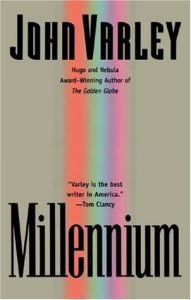 By John Varley
By John Varley
ISBN-13 — 978-0441006779
Publication Year: 1983
Tags: Science Fiction, Time Travel
Rating: ★★★★☆
Far over Oakland, California, a DC-10 commercial aircraft strikes a 747 in mid-air, bringing down both planes in an area covering several miles. No survivors. Air disaster investigator Bill Smith is searching for the reason for the crash, as a woman calling herself Louise Baltimore prepares, 50,000 years in the future, to stop him from finding out too much. The crash had to happen. It wasn’t that Louise caused it, but she left something behind on that plane, and Bill Smith can’t discover it before her, or the entirety of human history could be wiped out at a speed of hundreds of years per hour.
John Varley’s short story “Air Raid” (published in 1977) became the basis of the film Millennium, which was produced in 1989. This novel version of the film has a copyright date six years before that. More time-travel shenanigans? No; according to the author, in his collection The John Varley Reader, trying to get a green light to produce the film was downright nightmarish. The copyright for this novel, in fact, belongs to MGM/UA, who did (eventually) make the movie. Varley did pen the screenplay, and this novel is his expanded version of the tale.
The book is told in largely alternating portions of “testimony,” as each chapter or segment is labeled. It’s no spoiler to explain that Bill and Louise are telling their viewpoints of the same tale as if recording history as best they can explain it for whoever may be left after these rather horrifying messes of time travel have done their work. This allows for both more in-depth exploration of each character as well as a convenient means by which certain temporal anomalies can be dealt with (each can tell his/her story through their linear experience of the events). Each chapter is named for a reference to something else in time travel literature: “A Sound of Thunder” (short story by Ray Bradbury), “All You Zombies” (Heinlein), and so forth. A nice homage. (Varley managed to miss David Gerrold’s The Man Who Folded Himself (1973), which is a shame.)
The story itself vacillates between dark comedy and just plain dark, as each character trots out enough personal and existential flaws to sink any number of Vessels of Hope, whether on water, in space, or traveling through time. Varley’s vision of the far-distant future is dystopian not in the usual senses of political, religious, or militaristic persecution but in the sense that humans were just too damned stupid to figure out how to save themselves. As Louise vents, toward the end of the book:
“We made a mess of things? …It started with your great-grandfather and the industrial revolution. But it was you, you unspeakable son-of-a-bitch, your […] generation that really got things going. Did you really think there’d never be a nuclear war? There have been nineteen of them. Did you think nerve gases were just going to sit there, that nobody would ever use them? CBN, you called it. Chemical, Biological, Nuclear. You made plans just as if the world could survive it, just like it was another war you could win.”
What makes this novel one of the finest of the time travel genre is that it creates a complete and consistent science of time travel, much the same way that a good ethnographic tale is based on good world-building. An interesting concept here is that of “temporal censorship.” The future population is able to look into a “time tank” (a holographic presentation) to see into the past, but they cannot see into any point of space-time that they have visited… or will visit. This beautiful paradox exists for the purpose of preventing actual temporal paradox; visits to certain censored parts of the time line must have events found on either side of that censorship to figure out why they have-been/are-going to that time and place. This, by itself, makes for a delicious smorgasbord of scientific chestnuts to allow the reader to question the nature of time, of free will, and even of just who’s in charge of this insane sideshow after all. No spoilers, but you’ll need to read down to the last few pages to put the cherry on this lovely sundae.
There is, in one sense, an astonishingly Doctor Who-like quality to this work. As the Doctor has noted (in several of his regenerations), humans as a species simply will not lay down and quit. In the contemporary Doctor Who programs, at the end of the third series (David Tennant’s second of three series), a trilogy of episodes shows the human race hanging on by its collective fingernails despite the dying of the entire cosmos around them. In Millennium, Varley posits a particularly dark future, marked by a monumentally desperate attempt to find some way for these pesky humans to keep going, even if it means mucking around with time itself to do so.
All in all, a satisfying short read, with a nice little zetz at the end.
